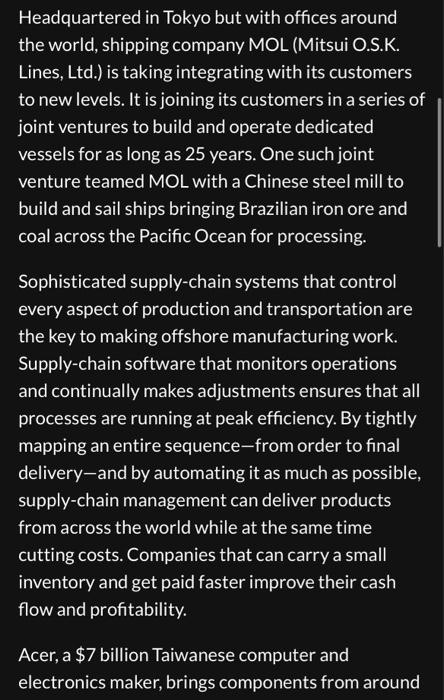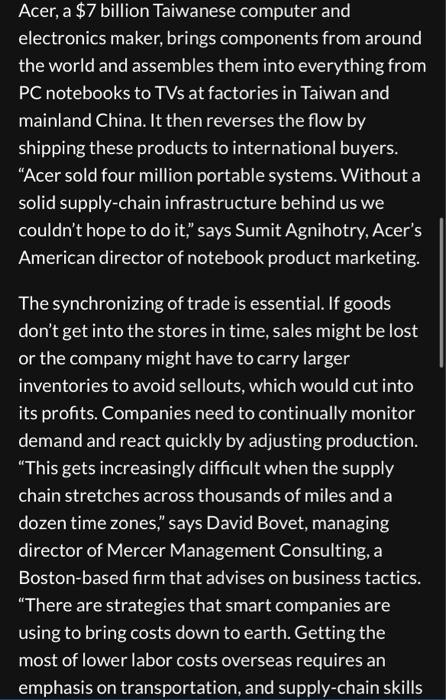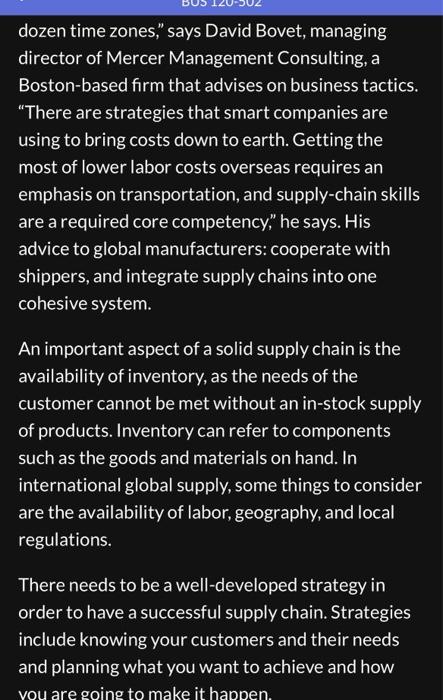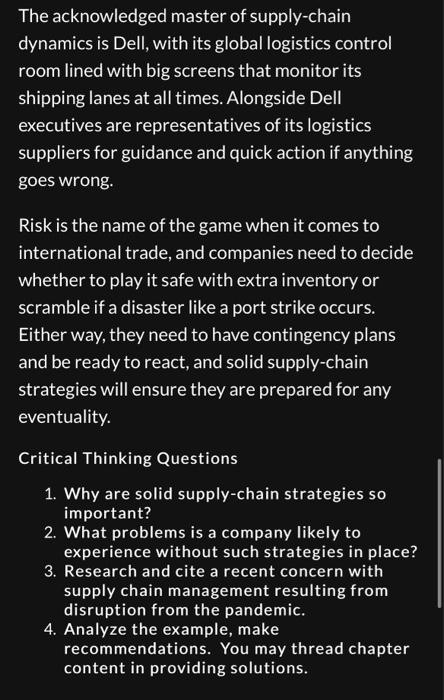- Why are solid supply-chain strategies so important?
- What problems is a company likely to experience without such strategies in place?
- Research and cite a recent concern with supply chain management resulting from disruption from the pandemic.
- Analyze the example, make recommendations. You may thread chapter content in providing solutions.
please answer full question
Headquartered in Tokyo but with offices around the world, shipping company MOL (Mitsui O.S.K. Lines, Ltd.) is taking integrating with its customers to new levels. It is joining its customers in a series of joint ventures to build and operate dedicated vessels for as long as 25 years. One such joint venture teamed MOL with a Chinese steel mill to build and sail ships bringing Brazilian iron ore and coal across the Pacific Ocean for processing. Sophisticated supply-chain systems that control every aspect of production and transportation are the key to making offshore manufacturing work. Supply-chain software that monitors operations and continually makes adjustments ensures that all processes are running at peak efficiency. By tightly mapping an entire sequence-from order to final delivery-and by automating it as much as possible, supply-chain management can deliver products from across the world while at the same time cutting costs. Companies that can carry a small inventory and get paid faster improve their cash flow and profitability. Acer, a $7 billion Taiwanese computer and electronics maker, brings components from around Acer, a $7 billion Taiwanese computer and electronics maker, brings components from around the world and assembles them into everything from PC notebooks to TVs at factories in Taiwan and mainland China. It then reverses the flow by shipping these products to international buyers. "Acer sold four million portable systems. Without a solid supply-chain infrastructure behind us we couldn't hope to do it," says Sumit Agnihotry, Acer's American director of notebook product marketing. The synchronizing of trade is essential. If goods don't get into the stores in time, sales might be lost or the company might have to carry larger inventories to avoid sellouts, which would cut into its profits. Companies need to continually monitor demand and react quickly by adjusting production. "This gets increasingly difficult when the supply chain stretches across thousands of miles and a dozen time zones," says David Bovet, managing director of Mercer Management Consulting, a Boston-based firm that advises on business tactics. "There are strategies that smart companies are using to bring costs down to earth. Getting the most of lower labor costs overseas requires an emphasis on transportation, and supply-chain skills dozen time zones," says David Bovet, managing director of Mercer Management Consulting, a Boston-based firm that advises on business tactics. "There are strategies that smart companies are using to bring costs down to earth. Getting the most of lower labor costs overseas requires an emphasis on transportation, and supply-chain skills are a required core competency," he says. His advice to global manufacturers: cooperate with shippers, and integrate supply chains into one cohesive system. An important aspect of a solid supply chain is the availability of inventory, as the needs of the customer cannot be met without an in-stock supply of products. Inventory can refer to components such as the goods and materials on hand. In international global supply, some things to consider are the availability of labor, geography, and local regulations. There needs to be a well-developed strategy in order to have a successful supply chain. Strategies include knowing your customers and their needs and planning what you want to achieve and how vou are going to make it happen. The acknowledged master of supply-chain dynamics is Dell, with its global logistics control room lined with big screens that monitor its shipping lanes at all times. Alongside Dell executives are representatives of its logistics suppliers for guidance and quick action if anything goes wrong. Risk is the name of the game when it comes to international trade, and companies need to decide whether to play it safe with extra inventory or scramble if a disaster like a port strike occurs. Either way, they need to have contingency plans and be ready to react, and solid supply-chain strategies will ensure they are prepared for any eventuality. Critical Thinking Questions 1. Why are solid supply-chain strategies so important? 2. What problems is a company likely to experience without such strategies in place? 3. Research and cite a recent concern with supply chain management resulting from disruption from the pandemic. 4. Analyze the example, make recommendations. You may thread chapter content in providing solutions










